Opening the Culture Door
2023 Conference Session Length: 1 hour, 40 min
Publish Date: April 2023
Everyone has a culture and our culture is the framework for our lives. Children naturally develop the characteristics that their own culture values. They begin to construct their identity and understand who they are by understanding their own culture and by responding to how others see and relate to them. Sometimes a cultural conflict, visible or invisible, contributes to challenging behavior. This session explores how understanding the impact of cultural influences on both the educator and the child can improve a teacher’s ability to prevent and respond to challenging behavior.
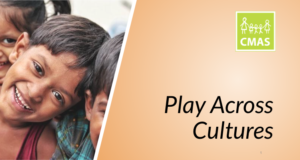 Play Across Cultures
Play Across Cultures
Tutorial length: 9 minutes
Publish Date: September 2022
Children are masters of play. It’s how they learn about culture, social norms, and language – and it provides endless opportunities for children to try out different roles, express themselves, and explore the world around them. But you may have noticed that children from different cultures engage in play differently. This makes sense because there are differences in language, context, and social norms in different cultures – and these are all reflected in children’s play! In this tutorial, participants will have the chance to reflect on how play is different across cultures, and how we can encourage and foster all kinds of play variations in our CNC programs. At the end of the tutorial, you’ll also find resources, references, a Facilitator Guide and Questions for Personal Reflection/Group Discussion so that you can easily facilitate your own team training. NOW ALSO AVAILABLE IN FRENCH!
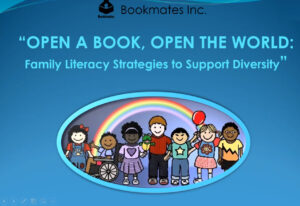
Publish Date: April 2023
This session is focused on sharing early literacy resources that promote diversity including race, creed, gender, culture, family structures, and abilities. We’ll have a chance to review the importance of being intentional with the types of early literacy information, tools, and strategies we incorporate into our programs, and explore concepts to strengthen, support, and enhance the fundamentals of literacy while celebrating diverse communities. Nancy will also share a variety of children’s books and related hands-on literacy extension activities that can be integrated into our current environments.

Publish Date: June 2023
Creating opportunities and experiences that bring program staff and families together is very important. Discover how to create a welcoming, nurturing environment. In this session, you’ll learn how to host family fun events, brainstorm interactive documentation opportunities, and celebrate daily activities with open consistent communication.
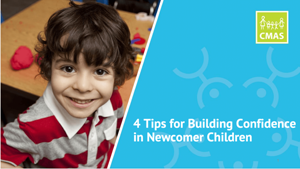 4 Tips for Building Confidence in Newcomer Children
4 Tips for Building Confidence in Newcomer Children
Tutorial length: 16 minutes
Publish Date: September 2018
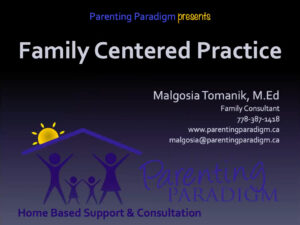
Family Centred Practice
2023 Conference Session Length: 56 minutes
Publish Date: April 2023
Family Centered Practice (FCP) creates partnership with families, treats them with dignity and respect, honors their values and choices, and provides supports to enhance their functioning as a family. In this session, we explore: FCP, contemporary approaches to working with families, relational and participatory components, collaboration, the role of the parent, effective help-giving, and how FCP can be linked to a wide range of benefits for both children and families.
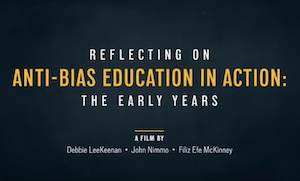 Reflecting on Anti-bias Education in Action: The Early Years
Reflecting on Anti-bias Education in Action: The Early Years
Webinar length: 2 hours
Publish Date: November 2021
CMAS is proud to present this recording of a special CNC film screening and panel discussion of the award-winning film, Reflecting on Anti-bias Education in Action: The Early Years, with co-producers Debbie LeeKeenan and John Nimmo, as well as featured teacher Nadia Janobeta. The film shifts the focus away from the talking heads of experts and on to the voices of teachers committed to equity and diversity on a daily basis. By taking viewers into diverse early childhood classrooms, the film seeks to demonstrate the importance of teacher reflection on identity, context, and practice in anti-bias education and provides a much-needed resource for teacher education and professional development.
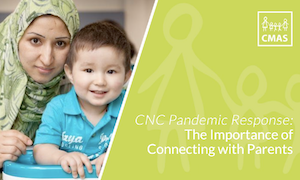
The Importance of Connecting with Parents
Tutorial length: 8 minutes
Publish Date: November 2020
In the CNC Pandemic Response: The Importance of Connecting with Parents tutorial, you have an opportunity to explore why it is so important to connect with parents each day, and strategies to build relationships, connect and share information with parents – even when face-to-face interactions are limited. At the end of the tutorial, you’ll also find resources, a facilitator guide and added group discussion questions so that you can easily facilitate your own team training.
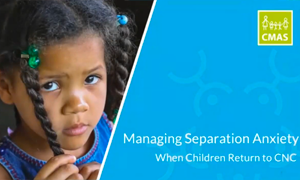
Managing Separation Anxiety When Children Return
Webinar length: 60 minutes
Publish Date: October 2020
For some parents and children, the idea of returning to CNC after pandemic closures is stressful. Many families will be experiencing separation anxiety and find the transition back to care challenging. In this webinar, CMAS consultant Jackie Cunningham provides CNC staff with 9 Tips for managing separation anxiety when children return and a printable tip sheet you can share with your team!
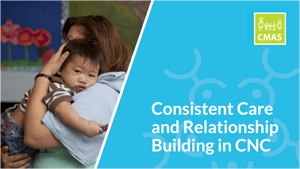
Consistent Care and Relationship Building in CNC
Tutorial length: 10 minutes
Publish Date: February 2020
The evidence is clear: successful attachments with primary caregivers in the early years have a profound impact on children in almost all areas of development! In fact, a child’s growth and development depends on the capacity of their caregivers to understand, perceive and respond to the child needs. So developing relationships and trust with the newcomer children in your care is key to supporting their settlement and early development. In CMAS’ new Consistent Care and Relationship Building in CNC tutorial, you’ll have an opportunity to consider how relationships impact children’s development and health, what is consistent care and why it is so important, which children might need a little more attention and care, and strategies for improving consistency and relationships for everyone. At the end of the tutorial, you’ll also find resources, references, a facilitator guide, and added group discussion questions so that you can easily facilitate your own team training. English version | French version
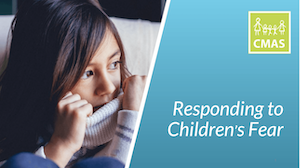 Responding to Children’s Fear
Responding to Children’s Fear
Tutorial length: 6 minutes
Publish Date: April 2022
For many of us, when a child expresses fear, it can be hard to know how to respond in a way that makes them feel heard and supported. In this tutorial, we’ll talk about how to respond to children’s fear, common mistakes, and why they’re important to avoid, and some practical tips with examples to help us understand and remember. At the end of the tutorial, you’ll also find resources, references, a facilitator guide, and added group discussion questions so that you can easily facilitate your own team training. At the end of the tutorial, you’ll also find resources, references, a facilitator guide and added group discussion questions so that you can easily facilitate your own team training.
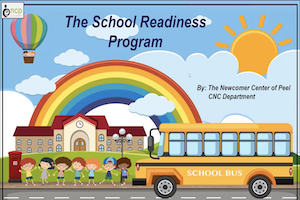 School Readiness with Newcomer Centre of Peel
School Readiness with Newcomer Centre of Peel
Webinar length: 1 hour
Publish Date: May 2022
School readiness means that children are ready for school, and families are ready to support their children’s learning – and CNC programs play an important role in preparing newcomer children and families for this transition. In this webinar, participants joined Jacqueline MoonSammy, Aisha Ilyas, and their team from Newcomer Centre of Peel (NCP), to talk about how they noticed a need in their CNC community, and developed a program to support school readiness for the children in their program. They talked about some of the challenges they faced, as well as some helpful tips and strategies you can use in your program to help prepare children for kindergarten in the fall!
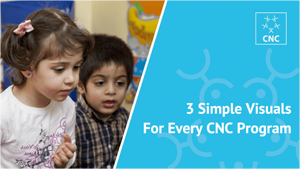
3 Simple Visuals For Every CNC Program
Tutorial length: 8 minutes
Publish Date: February 2019
Young children are naturally visual learners as they observe, imitate and learn to read body language. For newcomer children, visual cues can be even more important – especially when you don’t have a shared language!
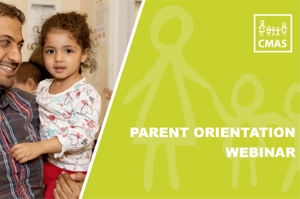
Parent Orientations Webinar
webinar length: 56 minutes
Publish Date: January 2020
A good parent orientation sets the stage for a smooth transition for newcomer families, but not every CNC team knows how to do it well. In this webinar, you have the opportunity to hear directly from three experienced CNC administrators. They share their unique perspectives, promising practices and strategies that they find helpful when it comes to CNC parent orientations. In response to participant requests, Polycultural Immigrant and Community Services has also shared their Sample Visual Parent Orientation Form. Once you have completed this webinar, we invite you to complete this evaluation, which will help with the development of future webinars. Watch the webinar…
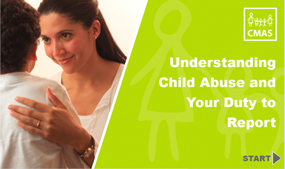
Understanding Child Abuse and Your Duty to Report
e-course length: 62 minutes
Publish Date: January 2020
Canada takes the protection of children very seriously. Each year thousands of children are subjected to abuse while in the care of their families. All of us who work with families need to understand our duty to report and role in protecting children. This includes knowing how to identify different types and indicators of abuse, cultural considerations, and steps to report and document suspected abuse–as well as strategies to support staff, parents, and children after a report has been made. Understanding Child Abuse and Your Duty to Report includes resources, helpful contact information, and links to legislation, as well as questions for reflection and/or discussion. English Version | French Version
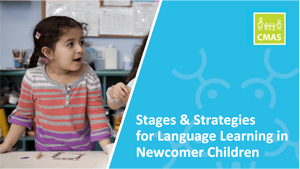
Stages & Strategies for Language Learning in Newcomer Children
Tutorial length: 13 minutes
Publish Date: October 2019
Learning a language is a complex process that is experienced differently by every child. But whether you’re supporting dual language learners, single, second or even multiple language learners in your program, it’s important to have a basic understanding of how language learning happens. In the Stages & Strategies for Language Learning in Newcomer Children tutorial, you’ll learn about the four stages of language learning and what to expect as children move through each phase. You’ll also find practical strategies that you can use to support children during each stage. At the end of the tutorial, there are resources, references, a facilitator guide and added group discussion questions so that you can easily facilitate your own team training.
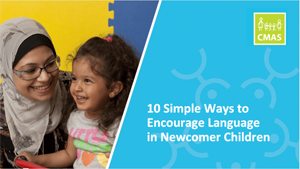
10 Simple Ways to Encourage Language in Newcomer Children
Tutorial length: 15 minutes
Publish Date: September 2019
Young children are naturally visual learners as they observe, imitate and learn to read body language. For newcomer children, visual cues can be even more important – especially when you don’t have a shared language!
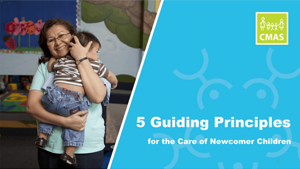 5 Guiding Principles for the Care of Newcomer Children
5 Guiding Principles for the Care of Newcomer Children
Tutorial length: 30 minutes
Publish Date: June 2018
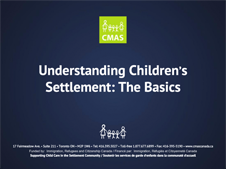 Understanding Children’s Settlement: The Basics
Understanding Children’s Settlement: The Basics
Tutorial length: 15 minutes
Publish Date: March 2018
International research shows that young immigrant and refugee children experience settlement needs in five key areas. To build responsive programs for newcomer children, CNC staff need to understand these unique needs and how they can help. Understanding Children’s Settlement: The Basics is a 15-minute tutorial that describes each settlement need and strategies you can use in your program. It will also give you tips on how you can tell if a child is settling successfully! At the end of the tutorial, you’ll also find suggested resources, a facilitator guide and added group discussion questions so that you can easily facilitate your own team training. English version | French version
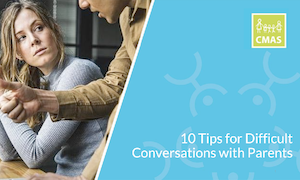 10 Tips for Difficult Conversations with Parents: The Basics
10 Tips for Difficult Conversations with Parents: The Basics
Tutorial length: 19 minutes
Publish Date: November 2017
Sometimes, we need to have difficult conversations with parents about their child’s development, challenges or needs. Planning for these interactions can be stressful, but this 19-minute tutorial provides you with tools and strategies, common mistakes to avoid, and 10 tips for planning ahead and managing difficult conversations in an approachable and professional way. It also includes a facilitator guide and 10 questions for group discussion and personal reflection to use with your team, extend your learning and help you identify concrete strategies that you can use in your program. Let’s get started!
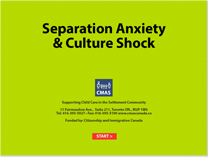 Separation Anxiety and Culture Shock
Separation Anxiety and Culture Shock
e-course length: 68 minutes
Publish Date: November 2012*
*Note that a newer resource (November 2017) on this topic– A Parent’s Guide to Gradual Separation – is also available in over 40 languages.
The Separation Anxiety and Culture Shock online workshop will help you understand separation anxiety in immigrant and refugee families and the impact of culture shock on the separation process.
The course offers strategies to help you manage separations, as well as parent expectations. From creating a sample separation plan to navigating your way through a gradual separation scenario, you will put these strategies into practice.
By the end of this workshop, you should feel confident in your ability to smoothly and professionally support newcomer children and parents through the separation process. Download PDF | Go to Course
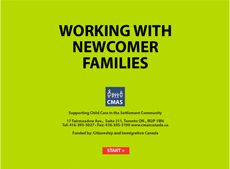 Working with Newcomer Families
Working with Newcomer Families
e-course length: 69 minutes
Publish Date: September 2012
The Working with Newcomer Families online workshop gives you the knowledge and tools to collaborate with and gain the trust of the families of the children in your care.
The course covers both the theory and practice behind topics that include family and child-centred care, diversity and bias, cross cultural child-rearing practices and communication, and building trusting relationships.
By the end of this workshop, you should feel confident in your ability to create positive, professional and trusting relationships with immigrant and refugee families that are based on mutual respect and recognition of the value of diversity. Download PDF | Go to Course
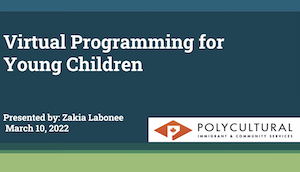 Virtual Programming for Young Children
Virtual Programming for Young Children
Webinar length: 1 hour
Publish Date: March 2022
Over the last two years, many SPOs have responded to the needs of newcomer families during the pandemic by delivering online services – and the SDR from one such organization has developed a webinar to share what they’ve learned! In this webinar, join Zakia Labonee, the SDR from Polycultural Immigrant and Community Services to talk about three important things to consider in developing virtual programming for young children: child development, building relationships, and family support.
Disclaimer: CMAS assessments and CNC focus is on onsite care. Please remember, that while there are no requirements or monitoring by CMAS for virtual services, there are associated risks. Each organization must take responsibility for ensuring that they have policies and procedures in place to deliver virtual programming safely.
